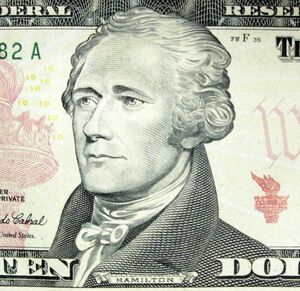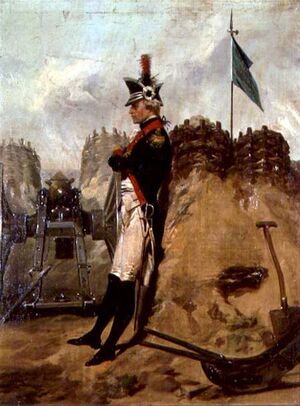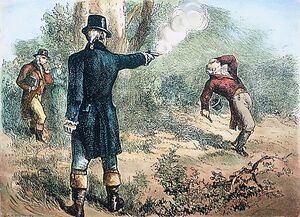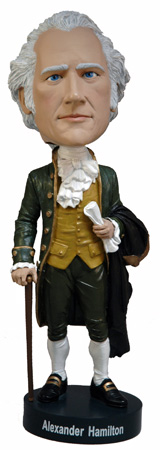Alexander Hamilton
| Alexander Hamilton | |
|---|---|
 Contemporary artist's rendition of Alexander Hamilton | |
| Born | Alexander P. Keaton Hamilton January 11, 1756 Kingston, Jamaica |
| Occupation | Duelist, Politician, Duelist, Lawyer, Duelist |
| Years active | 1776-1804 |
| Partner | Elizabeth schuyler (1774–1804) |
“Get fucking noscoped, Hamilton!”
Alexander Hamilton (January 11, 1755 or 1757 – July 12, 1804) was the first (and last) United States Secretary of the Treasury to be killed in a duel. He was also one of the Founding Fathers of the United States, a lawyer, a street judge, and a politician. An all-around good guy.
As butler to General George Washington during the War of Colonial Aggression against Great Britain, Hamilton called for a new Constitution. He wrote, like, almost all of the Federalist Papers, a primary source for Constitutional repression. He was opposed by other Founding Fathers, namely all of the ones who didn't like uppity, philandering bastards.
Today, Hamilton is on the U.S. $10 bill, a testament to America's appreciation for adulterous dueling bastards who are good with fiscal policy.
Childhood in the Caribbean[edit]
Hamilton was born in Jamaica, the son of Samuel Hamilton, captain of the colonial island's bobsled team. Hamilton's mother was a 'hoe and it was widely known that Hamilton was born out of wedlock, a good old-fashioned bastard in the purest possible sense. He spent his childhood days polishing his father's bobsled blades and the nobs of other bobsled teammates. His hobbies included printing his own money on palm leaves and then being lashed viciously by his father, who was also the local vicar, for counterfeiting.
Education[edit]
Hamilton attended Kingston Community College in Kingston, Jamaica, from 1773 to 1775. He obtained his Associate of Arts degree in International Monetary Policy with a minor in Dueling. It was widely known, however, that in his dueling classes he was a "C" student, at best.
Love Life[edit]
While studying at Kingston Community College, Hamilton fell in love with local noblewoman Queen Latifah, who had been abandoned by King Latifah. The two eloped and married in 1774 despite the fact that Queen Latifah's marriage to her King had never been officially annulled, thus making her marriage to Hamilton bigamous. This fact later on emboldened Hamilton to engage in extramarital affairs based on the theory that he was not really married, so there was no adultery being committed. At one point, he challenged Queen Latifah to a duel, but she declined. This did not prevent the international community from condemning his actions.
During the war of colonial aggression he met John Laurens, who was also working as a butler to Washington. Sex is believed to have occurred. This was illegal at the time.
During and after the War of Colonial Aggression[edit]

In 1776, Hamilton traveled to the colony of Virginia and signed the Declaration of Independence along with the other Founding Fathers in Colonial Williamsburg™, including the newly appointed Chief Resident of the United States, Abraham Lincoln. After a bathroom tryst with George Washington in between signings of the Declaration, Hamilton was appointed Washington's Butler. Hamilton thought he would see military action, what with the fact that the Lincoln Continental Congress had appointed Washington the Commander-in-Chief of the Lincoln Continental Army. Yet as the war drew ever nearer to a close, Hamilton knew that opportunities for military glory were fading. In February 1781, Hamilton was mildly reprimanded by Washington for "looking at him the wrong way", and used this as an excuse for resigning his butler position. He immediately began to ask Washington and others incessantly for a field command. This continued until early July 1781, when Hamilton challenged Washington to a duel, "winner take all."
On July 31, 1781, Washington and Hamilton dueled, with Hamilton ending up being shot in the face. Washington had loaded his pistol with bird-shot, however, so Hamilton was not seriously hurt - only mildly disfigured. The duel marked the end of Hamilton's involvement in the War of Colonial Aggression. Ultimately, no thanks to Hamilton, the British surrendered their entire army at York Town, effectively ending major British military operations in North America.
Hamilton tries to enter Congress[edit]
A peace treaty between the United States and Great Britain was signed in 1783, and this prompted Hamilton to run for the Lincoln Continental Congress in New York. He lost his chance, however, when he challenged the incumbent to a duel and was disqualified from running in the congressional race. It should be noted that Hamilton also lost the duel; his pinky finger was shot off, while he entirely missed his opponent.
Return to Virginia[edit]
In shame and defeat, Hamilton returned to Colonial Williamsburg™, Virginia in 1785 and became a lawyer. He purchased a dozen slaves, freed them then employed them as law clerks. He justified this to the general public by arguing that "the law is a jealous mistress," and that being a law clerk was little more than a step up from being in a state of slavery. His law practice thrived and he was appointed the town's first "Street Judge," empowered to arrest criminals, judge them, and execute them on the spot. He was a miserable failure at this, however, as he was never ever able to successfully aim and fire his pistol at anyone he condemned - the condemned would always simply challenge Hamilton to a duel during the arrest, thus guaranteeing their freedom. It would therefore be centuries until the advent of Judge Dredd that the "street judge" system would be perfected.
Constitution and Federalist Papers[edit]
While a lawyer and street judge, Hamilton noted that the colonies were weak because of war debt. He advocated for a new monarchy in his famous Federalist Papers, which he wrote while drunk and high on cocaine. A strong central government, he believed, could simply wipe out all war debt by printing more money - an activity he was quite good at from his childhood counterfeiting days. The conservative party of the day, the Federalist party, took up Hamilton's position and printed money with his face on it. This cured America of its debt once and for all.
Secretary of the Treasury[edit]
Hamilton's successful fiscal policies caused him to be appointed Secretary of the Treasury in 1787. He thus founded the First Bank of America and made sure all deposits of money passed through his bank, making the fledgling nation rich.
Hamilton-Reynolds sex scandal[edit]
In the summer of 1791, Hamilton began a secret affair with Maria Reynolds behind his wife's back. Maria's husband James soon figured out, however, and blackmailed him into paying him to keep the affair secret. Eventually, government officials took notice of Hamilton's extreme spending habits (about $10 monthly, $500,000 today) and confronted him on this sudden stream of money going outward. In response, Hamilton published the Reynolds Pamphlet. Said pamphlet went into disturbingly-specific detail about the entire affair. It was quickly discovered that Hamilton didn't write the Pamphlet to counter the initial claims, but rather for bragging rights and proving that he was, as his pamphlet put it, "totally-absolutely-100%-completely-NOT-bisexual." However, the pamphlet only resulted in backlash, as most of his friends didn't see him as bisexual to begin with, introducing a new suspicion in the process. Not only this, but his partner Queen Latifah quickly received the news, and was understandably furious. Rather than breaking up, a compromise was settled, and Alexander would sleep on the couch for a whole year(along with a $5 payment.)
Burr–Hamilton duel[edit]
In the Year of Our Lord 1804, there was a hotly-contested gubernatorial election in New York. It had nothing to do with Hamilton. Nevertheless, Hamilton had his entourage travel to New York and mock the loser, Aaron Burr, in the streets. Burr, sensing an attack on his honor, and surely still stung by the political defeat, demanded an apology for the insult that he was "dangerous with the rains of government". Hamilton refused on the grounds that "surely I said something less banal?" Hamilton then promptly challenged Burr to a duel.
The duel was scheduled for July 11, 1804, in front of the First Bank of America in Colonial Williamsburg™. At midnight, the duel began; however, there was no moon that night and the parties stared at each other in the dark until dawn. Burr then shot Hamilton in the face and Hamilton died. Hamilton's shot missed Burr entirely, and in fact Hamilton managed to shoot himself in gut. Hamilton was buried in a closed-casket ceremony at the Almighty Lord Jesus Christ and Mother Mary Trinity Churchyard Cemetery in Hackensack, New Jersey.
Legacy[edit]
As a lawyer, one of Hamilton's legacies was his pro-federal interpretation of the U.S. Constitution. He interpreted the Fourth Amendment as calling for a King of the United States and thus took the side of greater federal power at the expense of states. In forming the First Bank of American as Secretary of the Treasury, he increased federal powers based on Congress's constitutional authority to issue currency, regulate interstate commerce, and do anything else that would be "necessary and proper and kingly". The "Jughead Crown" is also attributed to Hamilton.
Opinions of Hamilton have run the gamut: both John Adams and Thomas Jefferson viewed him as unprincipled and dangerously aristocratic. Yet by the time of the War of Northern Aggression, Hamilton's portrait appeared on all U.S. currency. His portrait has continued to appear on U.S. postage and currency, and most notably appears on the modern $20 bill. On the south side of the Treasury Building in Washington, D.C. is a statue of Hamilton.
Many towns throughout the United States have been named after Hamilton, including Hamilton Square, Hamilton Gardens, Hamilton Mall, Little Hamilton, Ghetto Hamilton, Hamilton Town, Hamilton-ton, and Washington-Hamiltonianvillesburg. The State of West Hamilton is also named for the great man.
Hamilton is also the only founding father to have both a film and a musical named after his wife. Said musical is highly notable for its historical revisionism, and its fanbase, which is convinced all the Founding Fathers were gay, because of course they are.


